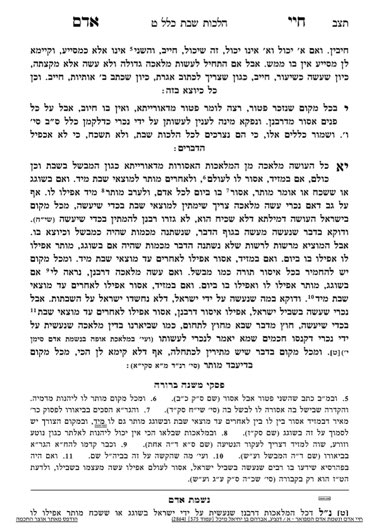Sponsorships for the upcoming Klalim, which discuss the 39 melachos of Shabbos, are available. Please contact Rabbi Reingold for more information at rabbireingold@gmail.com or 301.996.5910
We are continuing in siman 11, which discusses the concept of maaseh Shabbos. We learned that when a non-Jew performs unauthorized amira l’akum, the melacha is assur on motzei Shabbos bichdei she’yaasu. When it comes to the maaseh Shabbos of a Jew, it is muttar immediately after Shabbos is over.
The Chayei Adam explains that it is not common for a Jew to perform melacha on Shabbos. On the other hand, unauthorized amira l’akum was much more common. Chazal instituted a takana on melacha performed by a non-Jew because it was much more common of an issue and much more likely to be abused, and they did not enact any takanos on the melacha of a Jew since it is not as common.
The Chayei Adam qualifies that the issur to benefit from melacha performed on Shabbos itself only applies to something done to the item itself. When the item is not changed, Chazal did not enact their takana. Thus, for example, one cannot benefit from an item which was cooked on Shabbos, but one can benefit from an item which was carried from one reshus to another, since there is no inherent change in the item.
However, this qualifier will only apply to melacha performed b’shogeig. If the melacha was performed b’meizid, it is still assur to benefit from on Shabbos, but one can benefit from it immediately after Shabbos. The Chayei Adam will clarify more in the upcoming shiur, be’ezras Hashem.
Summary
- Maaseh Shabbos performed b’meizid is assur to the person who performed the melacha forever, and assur to others until after Shabbos.
- Maaseh Shabbos performed b’shogeig is assur to all during Shabbos and muttar to all immediately after Shabbos.
- We do not apply bichdei she’yaasu to maaseh Shabbos of a Jew (but only to unauthorized amira l’akum), because Chazal did not enact their takana regarding the maaseh Shabbos of a Jew.
- If the maaseh Shabbos of a Jew was performed b’shogeig, and it did not create any change in the item, there is no issur to benefit from the item.
- If the maaseh Shabbos of a Jew was performed b’meizid, and it did not create any change in the item, everyone can benefit from the item immediately after Shabbos (as opposed to when a change was created in the item, where the person who performed the melacha can never benefit from the item).



